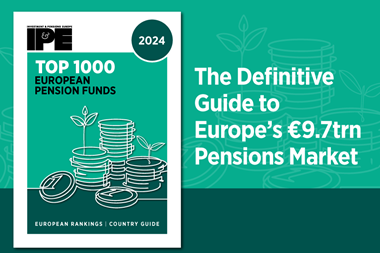Germany’s sustainable finance advisory group, the Sustainable Finance Beirat (SFB), is calling on the government to strengthen ESG and engagement strategies when investing public pension money to fend off the impact of climate risks.
The advisory board has recommended adding sustainability to security, liquidity and returns in laws regulating the principles to allocate public pension funds.
The government is responsible for laying out sustainable investment principles as a guideline for the investment of public funds, and checking them regularly, the SFB added in a document including recommendations to invest public funds sustainably.
There is currently a lack of uniform investment guidelines and requirements to allocate public funds considering sustainability aspects, the advisory board said.
Chair Silke Stremlau said: “Public [pension] assets too are exposed to climate risks, biodiversity loss and scarcity of resources. It makes economic and ecological sense to incorporate these risks into active investment strategies to a greater extent than before, and at the same time to invest, looking at opportunities, in the decarbonisation and resilience of our economy.”
Public pension pots mentioned in the document include the Federal Employment Agency fund (Versorgungsfonds der Bundesagentur für Arbeit); Versorgungsrücklage und Versorgungsfonds des Bundes, a fund used to relieve public finances from future federal pension expenses, and created to finance part of pension expenses for civil servants, judges and professional soldiers; and a fund to stabilise contributions in the long term, with assets totalling also €53bn, according to a reply of the government to a recent parliamentary inquiry of The Left (Die Linke) group.
Assets in the funds are already invested according to a best-in-class approach, ESG and exclusion criteria, according to the cabinet’s reply.
The board recommends to “further develop” portfolio allocation strategies, and implement them consistently across the various public funds, and to underweight companies that, following engagement, don’t make efforts to change the business model to help the economic transition.
It also suggests creating “white or black lists” of companies to invest in, it added.
The engagement strategy of public pension funds should be based on a basic understanding of transition, the Global Biodiversity Framework and the EU Taxonomy, setting clear goals, and applied consistently across public pension funds through asset management mandates, SFB said.
Engagement is a central part of sustainability approaches of public pension funds, the board added, referring specifically to AP2 in Sweden and the Government Pension Fund Global (GPFG) in Norway.
It is also recommending to publicly disclose sustainable investment strategies, through “regular reporting”, to the benefit of other investors and the society, and to drive the transformation to a sustainable economy, it added.
Public funds should disclose sustainability goals and strategies in line with the Corporate Sustainability Reporting Directive (CSRD), SFB said.
The latest digital edition of IPE’s magazine is now available























